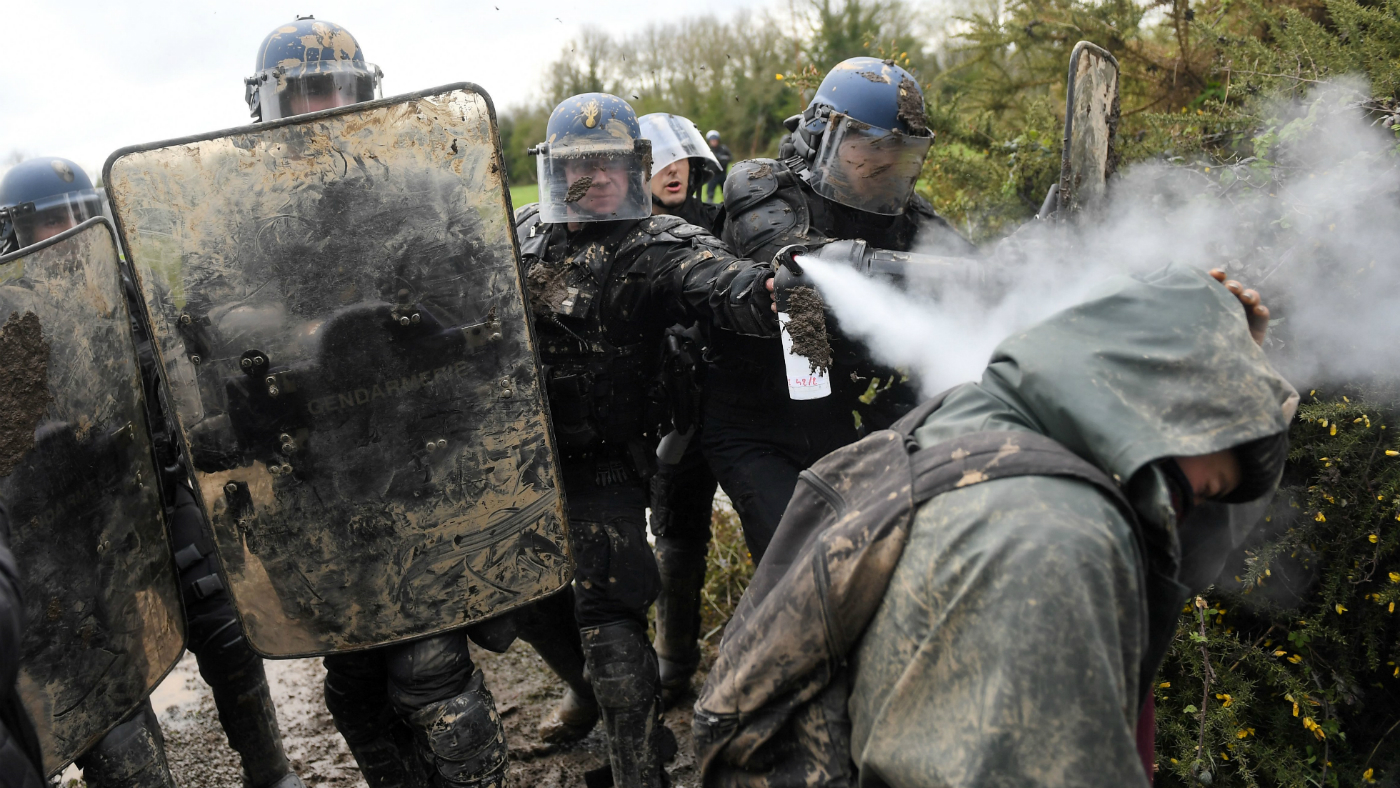Riot police clash with anti-capitalist squatters in France
Officers forcibly evict protesters from a decade-old camp built to block construction of an airport

A free daily email with the biggest news stories of the day – and the best features from TheWeek.com
You are now subscribed
Your newsletter sign-up was successful
Riot police have used tear gas and stun grenades to disperse environmental activists from a camp in western France.
Roughly 2,500 officers were involved in the eviction at Notre-Dame-des-Landes, which began at dawn on Monday. Activists responded by throwing mud, rocks and petrol bombs at police.
The group of around 250 protesters also used burning barricades of tyres, wooden pallets, hay bales and electricity poles to try to keep the gendarmes at bay, Agence France-Presse says.
The Week
Escape your echo chamber. Get the facts behind the news, plus analysis from multiple perspectives.

Sign up for The Week's Free Newsletters
From our morning news briefing to a weekly Good News Newsletter, get the best of The Week delivered directly to your inbox.
From our morning news briefing to a weekly Good News Newsletter, get the best of The Week delivered directly to your inbox.
Activists first occupied the 4,000-acre piece of land, now known as the ZAD (zone to be defended), in 2008 in protest against plans to build an international airport on the site.
After “years of dithering” by politicians over the future hub, President Emmanuel Macron scrapped the project in January, giving squatters until spring to clear out, The Times reports.
But the group of environmentalists, anarchists and anti-capitalists, have refused to leave, arguing that they have created a successful model of sustainable living.
For most who live there, the ZAD offers an “alternative, simpler and more utopian way of life”, The Guardian says.
A free daily email with the biggest news stories of the day – and the best features from TheWeek.com
Many have abandoned their tents and caravans and built permanent homes, or occupied abandoned farms, making them habitable and planting the land around, it adds.
“The state institutions have no power here,” one resident told the newspaper in December. “We have organised our lives without them – that’s what they don’t like. Even if they expel us we’ll come back. After a month, there will be thousands of us.”
Interior Minister Gerard Collomb said the police would remain on site “as long as is necessary” to prevent activists from returning.
-
 Sepsis ‘breakthrough’: the world’s first targeted treatment?
Sepsis ‘breakthrough’: the world’s first targeted treatment?The Explainer New drug could reverse effects of sepsis, rather than trying to treat infection with antibiotics
-
 James Van Der Beek obituary: fresh-faced Dawson’s Creek star
James Van Der Beek obituary: fresh-faced Dawson’s Creek starIn The Spotlight Van Der Beek fronted one of the most successful teen dramas of the 90s – but his Dawson fame proved a double-edged sword
-
 Is Andrew’s arrest the end for the monarchy?
Is Andrew’s arrest the end for the monarchy?Today's Big Question The King has distanced the royal family from his disgraced brother but critics claim a ‘fit of revolutionary disgust’ could still wipe them out
-
 Greenland’s capital becomes ground zero for the country’s diplomatic straits
Greenland’s capital becomes ground zero for the country’s diplomatic straitsIN THE SPOTLIGHT A flurry of new consular activity in Nuuk shows how important Greenland has become to Europeans’ anxiety about American imperialism
-
 Epstein files topple law CEO, roil UK government
Epstein files topple law CEO, roil UK governmentSpeed Read Peter Mandelson, Britain’s former ambassador to the US, is caught up in the scandal
-
 Iran and US prepare to meet after skirmishes
Iran and US prepare to meet after skirmishesSpeed Read The incident comes amid heightened tensions in the Middle East
-
 Israel retrieves final hostage’s body from Gaza
Israel retrieves final hostage’s body from GazaSpeed Read The 24-year-old police officer was killed during the initial Hamas attack
-
 China’s Xi targets top general in growing purge
China’s Xi targets top general in growing purgeSpeed Read Zhang Youxia is being investigated over ‘grave violations’ of the law
-
 Panama and Canada are negotiating over a crucial copper mine
Panama and Canada are negotiating over a crucial copper mineIn the Spotlight Panama is set to make a final decision on the mine this summer
-
 Why Greenland’s natural resources are nearly impossible to mine
Why Greenland’s natural resources are nearly impossible to mineThe Explainer The country’s natural landscape makes the task extremely difficult
-
 Iran cuts internet as protests escalate
Iran cuts internet as protests escalateSpeed Reada Government buildings across the country have been set on fire